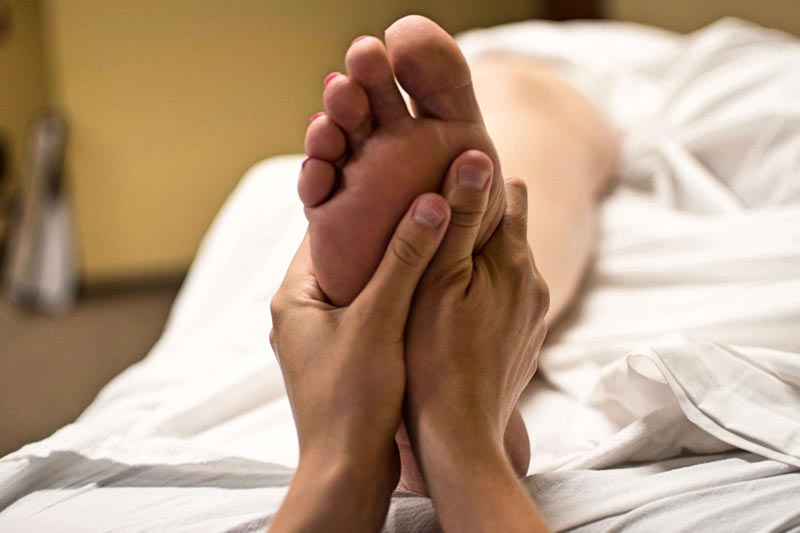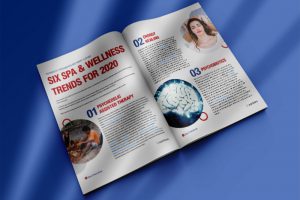
A roundup of scientific evidence that massage can reduce stress. This can be a powerful coping tool during the holiday season when stress levels are known to spike.
The holidays can be a stressful time, even if you love the season.
A survey conducted last year by the American Psychological Association found that 38% of people said their stress levels increased over the holidays and that this affect was more marked in women than in men (44% vs 31%). Other surveys have found that much higher numbers — as many as 90% — of people get stressed out over the holidays about a variety of things. These include money, weight gain, crowds and long lines, travel, and spending time with relatives. And this stress can have real consequences on both physical and psychological wellbeing.
Fortunately, the massages offered at your spa can help your guests cope with the skyrocketing stress levels associated with the most wonderful time of the year. If people are looking for scientific evidence that massage can reduce stress, here is a roundup of findings about the effects of different applications of massage – including reflexology and facial massage – on stress and anxiety levels.
Massage therapy decreases stress and anxiety
Researchers at the Touch Research Institutes examined studies on the effects of massage therapy on biochemistry, including decreased cortisol and increased serotonin and dopamine levels. The research reviewed included studies on depression, pain, auto-immune conditions, HIV, breast cancer, and stress from work, aging, and pregnancy.
In studies in which levels of the stress hormone cortisol were measured, significant decreases, averaging 31%, were noted. In studies measuring the neurotransmitters serotonin and dopamine, both of which contribute to feelings of happiness and wellbeing, an average increase of 28% was noted for serotonin and an average increase of 31% was noted for dopamine. The authors wrote, “These studies combined suggest the stress-alleviating effects (decreased cortisol) and the activating effects (increased serotonin and dopamine) of massage therapy on a variety of medical conditions and stressful experiences.”
Another study found that subjects who underwent Swedish massage twice a week experienced decreases in cortisol levels and increases in oxytocin levels. Researchers also found slight evidence of increased white blood cell counts.
Reflexology is associated with stress reduction and decreased blood pressure
A 2007 study at Angela Ruskin University examined the effects of reflexology on stress and anxiety and found that patients who underwent reflexology treatments experienced bigger decreases in anxiety and cardiovascular activity than a control group. These results were consistent with “stress reduction,” said the authors.
Also, a 2017 study published in the European Journal of Integrative Medicine found that hand reflexology alleviated anxiety without any adverse effects on patients before coronary angiography, and concluded that it can be recommended as a non-pharmacological nursing intervention along with other methods to relieve patients’ anxiety.
And a 2006 study published in the Journal of Korean Academy of Nursing looked at the effects of a self-foot reflexology massage on depression, stress responses and immune function in middle-aged women, and found that there was a statistically significant difference in depression, perceived stress, systolic blood pressure, and natural-killer cells. The authors concluded that “a self-foot reflexology massage could be utilized as an effective nursing intervention to reduce depression and stress responses, and to strengthen immune systems in middle-aged women.”
Facial massage lifts mood and calms anxiety
Facials aren’t just good for the skin. They’re also good for mood and wellbeing.
A 2008 study at Kyushu University, in Fukuoka, Japan found that a 45-minute facial massage reduced anxiety and alleviated negative mood in healthy adult women.
The study involved 32 women, ranging in age from 20 to 40. Each received the same type of facial massage, in which the face was first massaged using a cream-based lubricant. That was followed by a steam treatment, after which the face was massaged again with a moisturizing lotion. Heart rate and parasympathetic and sympathetic nervous activity were measured before and after each massage. Mood and anxiety levels were also measured. Parasympathetic nervous activity increased during the massage, and sympathetic nervous activity increased afterwards. The former is linked with a relaxed physical state, and the latter to a stimulated physical state, and study authors theorized that facial massage may have a stimulating or refreshing effect as well as relaxation benefits.
The study also found significant decreases in anxiety and negative mood. “These results suggest that the facial massage had strong effects on stress alleviation, or psychological relaxation,” said the authors.
 We’ve released our spa and wellness trends to watch for 2020. Sign up for Spa Executive’s newsletter and download the free report! CLICK HERE >>
We’ve released our spa and wellness trends to watch for 2020. Sign up for Spa Executive’s newsletter and download the free report! CLICK HERE >>
Spa Executive magazine is published by Book4Time, the world’s most innovative spa, salon, wellness, and activity management software. Learn more at Book4Time.com.



